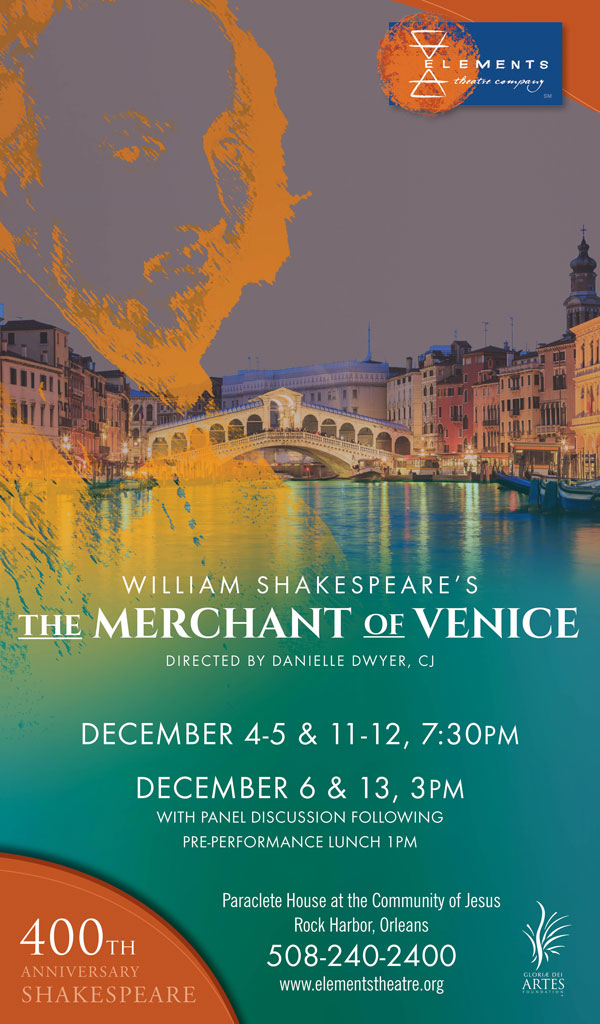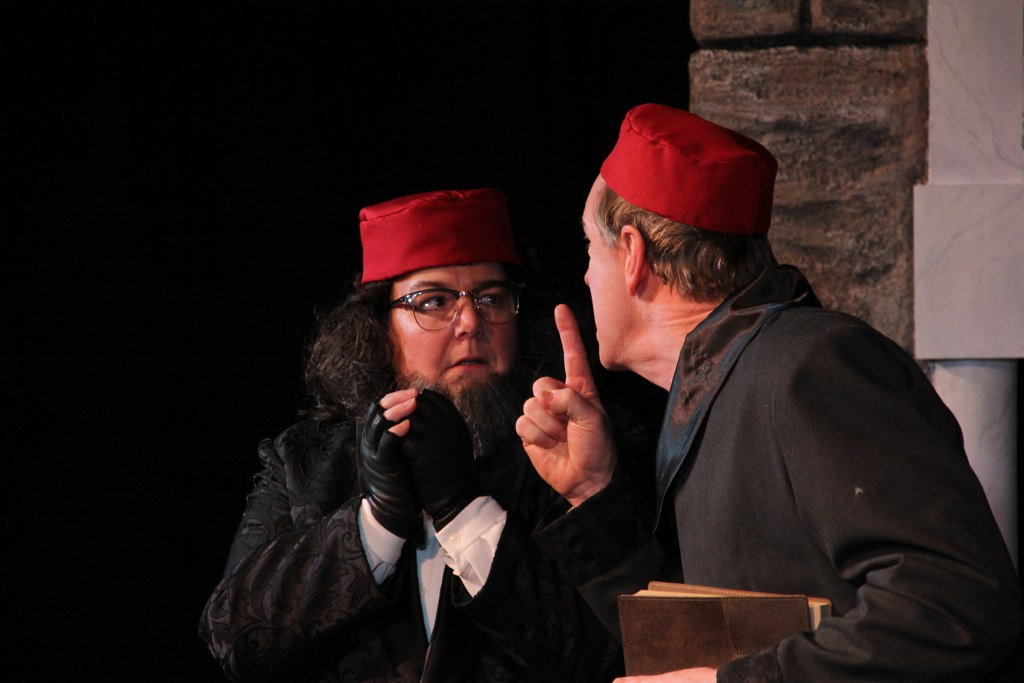
Show Information
From the Director
Show Gallery

The Merchant of Venice
By William Shakespeare
December 2015
“The Merchant of Venice,” Elements Theatre Company, Orleans: While Shakespeare’s play itself is problematic, this production was impeccably acted and beautifully designed. It was clear the company had dug deeply into all aspects of this play and era.”—Cape Cod Times’ “Top Favorites” for 2015
“I commend [Elements Theatre Company] for seeking to be agents of change through art. “Encountering the Other” challenges us to hold a mirror to ourselves and peer into our own prejudices and behavior. By doing so, we are stirred to make new choices, hopefully ones that lean toward mercy.”—America Magazine
PLOT
Antonio, a royal merchant in Venice, finds himself sad and weary, in spite of his great fortune and his many friends. Among the party of young and lively bachelors that surround him is Bassanio, who asks Antonio to lend him 3,000 ducats so that he may travel to Belmont and woo the rich and beautiful lady, Portia. Antonio gladly agrees, but is short on cash as all his ships are out at sea, and conscripts Bassanio to find him a lender.
Portia, the lady heiress of Belmont, is also weary, plagued as she is by suitors who come from the world over to win her hand (and her considerable fortune), according to a contest laid out by her father in his will. Portia must marry the man who from a choice of three caskets, made of gold, silver and lead, correctly chooses the casket containing her portrait.
In search of a source for his loan Bassanio brings Shylock, the Jewish moneylender, to Antonio. Their history is rife with hatred: Antonio lends without interest, costing Shylock clients and income, and Antonio has made his revulsion to Shylock clear with verbal and physical insults. Nonetheless Shylock agrees to the loan, and in lieu of interest, convinces Antonio to forfeit a pound of his own flesh if he is unable to make good on his repayment of the 3,000 ducats. Bassanio takes the money and his friend Gratiano and leaves for Belmont. Meanwhile Shylock’s daughter Jessica expresses her great unhappiness and shame in her father’s house, and reveals her plan to steal her father’s money and elope with another Venetian bachelor (and a Christian), Lorenzo.
Back in Belmont the Prince of Morocco and the Prince of Arragon both choose the incorrect caskets, losing their chances of Portia and her fortune, and completely foregoing their option to marry in the future. In Venice the news is swirling: Shylock learns of his daughter’s betrayal, and of a rumor that Antonio’s ships have been lost at sea. Ignorant of this Bassanio sweeps into Portia’s house, wins her heart, and selects the correct casket, thereby winning her hand and her fortune as well. At the same time his friend Gratiano falls in love with Portia’s lady in waiting, Nerissa, and they also make plans to marry. Their happiness is suspended with the news of Antonio’s demise, his inability to pay the debt, and Shylock’s demand for his pound of flesh. Portia sends Bassanio back to Venice with enough money to pay the debt several times over.
Shylock has Antonio arrested for his failure to pay. Portia and Nerissa secretly leave Belmont for Venice too, disguising themselves as men. In Venice, Antonio’s trial is underway, with the Duke of Venice presiding. Upon Shylock’s refusal to accept Bassanio’s offer to repay the loan, the Duke announces that he has called for legal reinforcement from Doctor Bellario in Padua. Nerissa (disguised as a clerk) appears with a letter from Bellario, introducing “Balthazar,” the brilliant legal student he has sent to pass judgment. “Balthazar” (Portia, also disguised) arrives, reads the contract, attempts unsuccessfully to reason with Shylock, and determines that Shylock is indeed entitled to his pound of flesh. Shylock is thrilled until Portia quickly points out that the contract includes no blood; therefore Shylock must exact the flesh without shedding a single drop, or he will be arrested for it. Shylock attempts to recant and take the money, but Portia brings up another sticking point: as a Jew, and therefore an alien, Shylock has made an attempt on the life of a Venetian citizen, and has thereby rendered his own life forfeit. The Duke shows mercy, and allows Antonio to pass the final sentence: Shylock may keep half his wealth, but he must give the other half to Lorenzo and Jessica (with the promise of leaving it all to them upon his death), and he must become a Christian.
Not recognizing his wife, Bassanio offers “Balthazar” a tribute of his thanks for saving Antonio’s life. Portia takes the opportunity to ask for his ring—the ring she had given him upon their marriage, with the promise that he should never let it part from his finger. Reluctantly, he hands it over, as Gratiano does his to Nerissa (whom he also does not recognize). The women race back to Belmont arriving just before their husbands return. Portia welcomes back Bassanio, Gratiano and Antonio, but the news quickly surfaces that both new husbands have given away their rings. The two wives torture them with accusations of infidelity. Finally Portia reveals that it was her and Nerissa all along in the courtroom, that three of Antonio’s ships are safe and sound, and that Lorenzo and Jessica will receive a fat inheritance from Shylock. The celebration begins.

